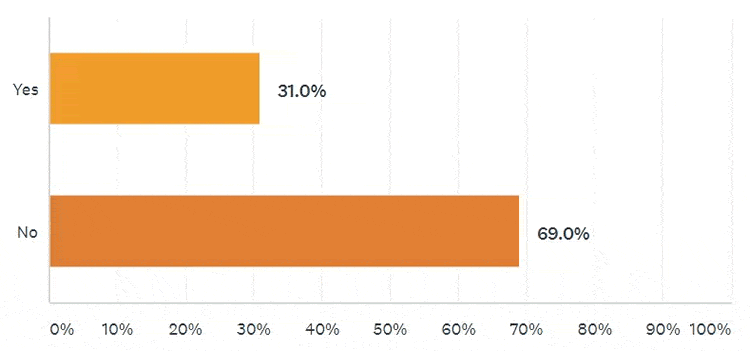Last month, the LANDTHINK Pulse posed the following question to our audience: Would you consider purchasing a property with an active oil or gas well, knowing the oil/gas rights will not convey with the purchase?
September Pulse Sponsored by
Our informal online survey revealed that 69.0% of respondents WOULD NOT consider buying land with an active oil or gas well if the mineral rights would not be conveyed in the sale of the property. Buying land for sale is complicated even under the best of circumstances. Finding the perfect property comes with many considerations, and when you find a piece of land that checks all the boxes on your list, it’s important to know which rights come with the property. In a buyers’ zeal to quickly close the deal, the matter of mineral rights can easily be overlooked. Due diligence is the vital, critical research that all buyers need to perform when investing in land, and it’s doubly important when mineral rights are involved.
Mineral rights (often referred to as a “mineral interest” or a “mineral estate”) are property rights to underground substances such as oil, natural gas, coal and precious metals, non-precious or semi-precious metals (such as copper or iron), and other valuable elements like uranium. Mineral rights can be described as the unseen value associated with a tract of land. The owner of the mineral rights has full legal rights to extract, sell, or lease all organic and inorganic substances located under a specific parcel of surface land.
Typically, when ownership of a property is transferred, it’s a “fee simple” arrangement. It is one of the most basic forms of real estate ownership. When a buyer purchases a fee simple property, they own the property and the structures on the surface of the land, and also the subsurface and air rights to the property. A fee simple estate in land is the highest form of ownership recognized by law, but fee simple ownership doesn’t supersede government regulations.
In some parts of the U.S., where oil, gas, and energy resources are plentiful, it’s common for the surface and subsurface (mineral) estates to be owned by different parties. This is referred to as split or severed estate. Mineral rights can also be held as a fractional estate, when a landowner owns a portion of the mineral rights. This usually happens when an owner divides rights among several heirs as part of an inheritance, or chooses to sell some mineral rights but retain others.
Once mineral rights are severed from the surface estate, the mineral estate becomes the dominant estate and the surface estate becomes the servient estate, or the land that is burdened by an easement. The mineral estate is real property, but is taxed separately only when severed from the surface estate.
The mineral estate has an implied easement to use the surface in any way that is reasonably necessary for the exploration, drilling, production, and transportation of minerals. This includes the right to choose locations, construct roads, tanks, pumps, holding ponds, buildings or other infrastructure, and to use groundwater.
Mineral rights are complex, and the status of mineral rights does not always appear on the warranty deed. The only way to be sure that a deed actually conveys mineral rights is to research the chain of title to confirm the mineral rights were not previously severed. It’s best to have a title or abstract company perform the search. The title abstractor can ascertain whether the mineral rights have ever been reserved or leased by any previous owners.

As evidenced by the results of last month’s question, whether or not a land buyer owns the minerals under the land is a real concern, especially in areas of the U.S. where oil rigs are a common sight and natural gas drilling is prevalent. If mineral rights don’t convey with the property being purchased, the mineral owner might come knocking at the door. Not surprisingly, only 31.0% of respondents said that they WOULD consider purchasing a property with an active oil or gas well, knowing the mineral rights would not convey with the sale of the property.
Absence of mineral rights is a deal breaker for buyers who want to retain complete control over the land they are purchasing. This begs the question: Should buyers only search land for sale with mineral rights still attached? It depends upon the intended use of the land. If the main goal of the buyer is simply to invest and turn a profit, mineral rights acquisition would make the land more valuable. Many people, however, just want to buy land they can use for hunting and various outdoor recreational activities. Some are seeking a parcel of farmland for sale on which they can grow crops and raise livestock. Oftentimes, the surface of the land will be just as useful to a landowner without the mineral rights as it would with them.
For buyers that live in regions of the U.S. that are long known to hold a land resource, getting hung up on mineral rights can delay discovering and securing the property of their dreams. Buyers need to remember that obtaining mineral rights to a tract of land will come with a much higher price tag. Mineral rights also come with a tax liability just like any other asset, whether the minerals are being produced or not.
Usually when a property is sold with a mineral reservation, there is already a pre-negotiated oil/gas lease in place. A certain amount of acreage is required for an oil and gas operator to drill a well, and keeping it in production will cause a certain amount of surface disruption. However, most companies will employ a plan to minimize disturbance of the surface and the surface owner is usually entitled to compensation for any damages.
Most oil, gas, and mining companies will make an effort to work with the surface owner to avoid conflicts. Some states, including Texas, Colorado, West Virginia and Arkansas, recognize what is known as the Accommodation Doctrine, which offers protections to a surface owner’s existing surface uses under certain conditions that must be met and proven.
The sheer complexity of mineral rights make it more important than ever for land buyers to work with an experienced land professional. Land buyers would also be well advised to seek the aid of an attorney who is familiar with mineral and surface rights in the area where they are considering buying land. An attorney will assist in unraveling the history and legal status of mineral rights associated with the property under consideration.
LANDTHINK would like to thank HomeLand Properties for sponsoring the September Pulse and for coming up with a very interesting question to pose to our audience. Buying, selling, or leasing land, home, or commercial property? HomeLand Properties does it all. The company includes agents specializing in residential, acreage, and commercial sales, as well as rental properties and property management. HomeLand Properties has been in business since 1990 and continues to stay current with the most up-to-date technology and resources to better serve their clients.
Become a Pulse sponsor! It’s a great way to ensure your brokerage is the first one buyers and sellers call when they have a need to buy or sell property. You’ll get insane exposure on Social + Email + Web. That’s 500,000+ monthly eyes on you! Once you have it, you won’t want to give it up! Pulse sponsorships are offered on a first come first serve basis and are subject to certain limitations. If your business would be interested in sponsoring a Pulse question, please contact us soon.
Do you have a Pulse question you’d like to suggest? Submit your question and we might choose yours!
We want to know what you think about our October Pulse question, chosen and sponsored by Farm Credit of North Carolina. At what point in the land purchase process do you explore financing options? Answer now.
This content may not be used or reproduced in any manner whatsoever, in part or in whole, without written permission of LANDTHINK. Use of this content without permission is a violation of federal copyright law. The articles, posts, comments, opinions and information provided by LANDTHINK are for informational and research purposes only and DOES NOT substitute or coincide with the advice of an attorney, accountant, real estate broker or any other licensed real estate professional. LANDTHINK strongly advises visitors and readers to seek their own professional guidance and advice related to buying, investing in or selling real estate.











Add Comment